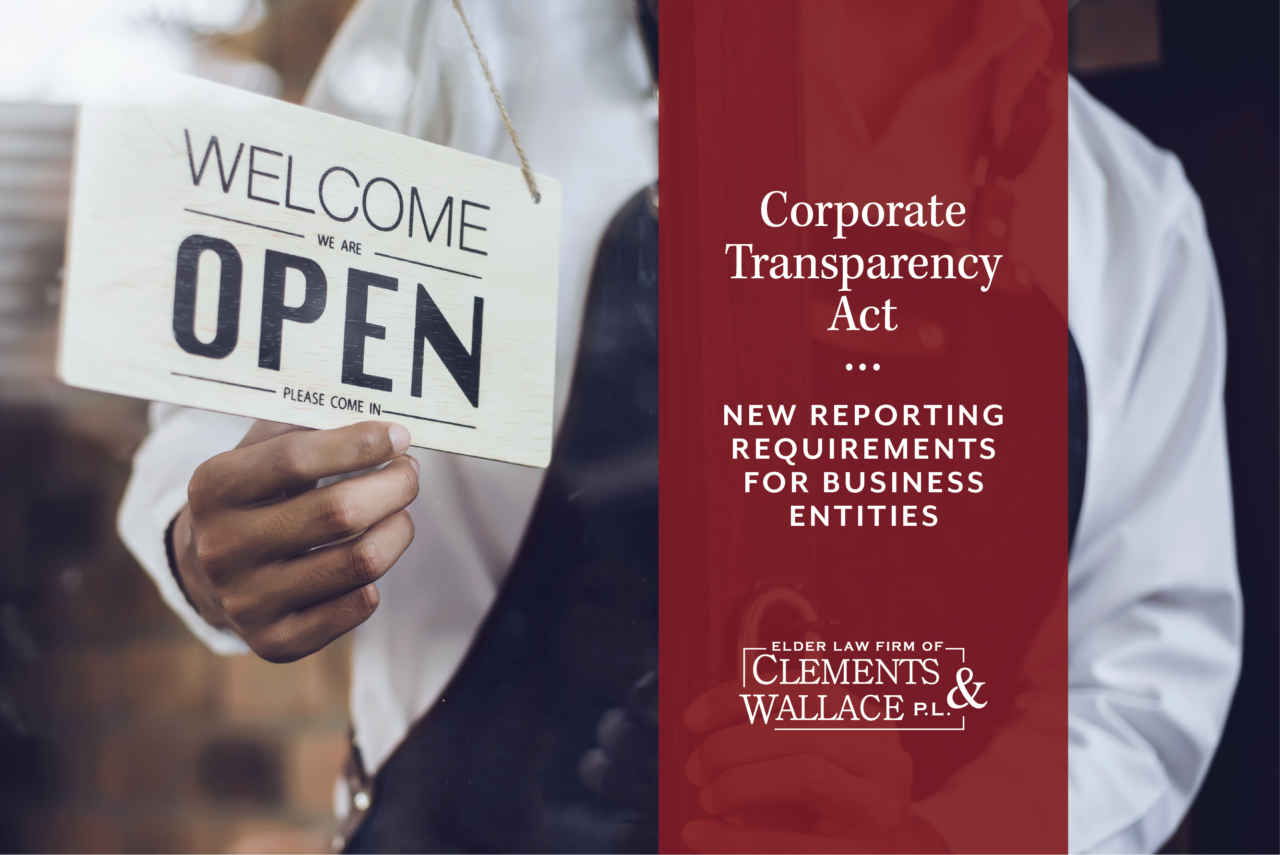Corporate Transparency Act: New Reporting Requirements for Business Entities

On January 1, 2021, the United States Congress enacted the Corporate Transparency Act (the “Act”). The stated goal of this legislation was to “protect interstate and foreign commerce” and to “better enable critical national security, intelligence, and law enforcement efforts to counter money laundering, the financing of terrorism, and other illicit activity.”
As a result, many businesses—including, but not limited to, corporations, limited liability corporations, professional limited liability corporations, and some partnerships—will be required to report certain “beneficial ownership” information to the Financial Crimes Enforcement Network (FinCEN), a part of the United States Department of the Treasury, beginning on January 1, 2024.
If you operate a business, have an ownership interest in a business, or otherwise benefit from the operation of a business, the following information may be helpful as these new rules may apply to you.
Under the new reporting rules, businesses which meet the definition of “reporting companies” under the Act must report “beneficial ownership information” to FinCEN via an online portal which will become operational on January 1, 2024.
Who is Required to Report?
A “reporting company” is any corporation, limited liability company, or other entity which is created by the filing of a document with a secretary of state (of any state, tribe, or territory), or any similar governmental or regulatory office in the United States. Foreign companies which are registered to do business in the United States by making a similar filing with any secretary of state or similar office are also considered “reporting companies” under the law and must make the same disclosures.
While most companies will need to report, the Act makes an exception for twenty-three (23) types of entities and exempts them from the Act’s reporting requirements. Entities which are exempt from the new rules include:
- Securities reporting issuer
- Governmental authority
- Bank
- Credit union
- Depository holding company
- Money services business
- Broker or dealer in securities
- Securities exchange or clearing agency
- Other Exchange Act registered entity
- Investment company or investment advisor
- Venture capital fund adviser
- Insurance company
- State-licensed insurance provider
- Commodity Exchange Act registered entity
- Accounting firm
- Public utility
- Financial market utility
- Pooled investment vehicle
- Tax-exempt entity
- Entity assisting a tax-exempt entity
- Large operating company
- Subsidiary of certain exempt entities
- Inactive entity
If you believe that your business may fall into any of the above exceptions, you should review FinCEN’s Small Entity Compliance Guide to better determine whether your entity qualifies and, if you are still not sure, consult an attorney. In addition to the above, sole proprietorships and trusts are not considered “reporting companies.”
Who is a Beneficial Owner?
An individual is considered a “beneficial owner” of a company if that individual either (a) directly or indirectly exercises “substantial control” over a reporting company or (b) owns at least 25% of a reporting company’s ownership interests.
Individuals are considered to have “substantial control” over a reporting company if they fall into any of the following four categories:
- Senior Officers. The company’s president, chief financial officer, general counsel, chief executive officer, chief operating officer, or any other officer performing a similar function.
- Authority to Appoint and Remove. The individual has authority to appoint or remove certain officers or a majority of directors (or similar body) of the reporting company.
- Important Decision-Maker. The individual is an “important decision-maker” in the company, meaning that that individual directs, determines, or has substantial influence over important business decisions, including the general operation of the business, the finances of the business, and the structure of the business.
- Other Forms of Substantial Control. The individual has any other form of substantial control of the business as set forth in Chapter 2.1 of the Small Entity Compliance Guide.
An individual is also considered a “beneficial owner” of that individual owns at least 25% of a reporting company’s ownership interests. An ownership interest is any arrangement which establishes ownership rights in the reporting company, including, but not limited to, shares of equity, stock, voting rights, or any other mechanism that establishes ownership in the company.
While trusts are not considered “reporting companies” under the law, the trustee, beneficiaries, or grantor of a trust can be considered a “beneficial owner” of a reporting company if the trust itself has an ownership interest in a reporting company. A trust beneficiary may be considered a “beneficial owner” if such beneficiary is the sole permissible recipient of trust income, has the right to demand a distribution from the trust, or has the authority to withdraw substantially all of the trust assets. A trust’s grantor (sometimes called a ‘settlor’) is considered a “beneficial owner” if they have the right to revoke or withdraw assets from a trust that holds an ownership interest in a reporting company.
When Should Reports be Made?
The timeline for filing a report with FinCEN varies and is triggered by the date an agent of the reporting company receives notification from the secretary of state (or similar office) that the reporting company has officially been registered with the state or other authority:
- Reporting companies formed before January 1, 2024, must make their initial report to FinCEN before January 1, 2025.
- Reporting companies formed on or after January 1, 2024, must make their initial report within 90 days of the trigger date.
- Reporting companies formed on or after January 1, 2025, must make their initial report within 30 days of the trigger date.
Additional information on the Corporate Transparency Act and its reporting requirements can be found online at www.fincen.gov/boi. If you are not sure whether these reporting requirements apply to you or have other questions regarding the Corporate Transparency Act, please call our office to schedule a consultation.
category: News